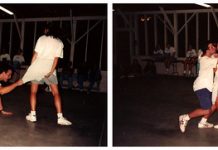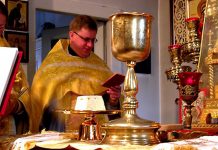(To access the bookmark download the PDF version.)
Proud people focus on the failures of others.
Broken people are overwhelmed with a sense of their own spiritual need.
Proud people have a critical, fault-finding spirit; they look at everyone else’s faults with a microscope but their own with a telescope.
Broken people are compassionate; they can forgive much because they know how much they have been forgiven.
Proud people are self-righteous; they look down on others.
Broken people esteem all others better than themselves.
Proud people have an independent, self-sufficient spirit.
Broken people have a dependent spirit; they recognize their need for others.
Proud people have to prove that they are right.
Broken people are willing to yield the right to be right.
Proud people claim rights; they have a demanding spirit.
Broken people yield their rights; they have a meek spirit.
Proud people are self-protective of their time, their rights, and their reputation.
Broken people are self-denying.
Proud people desire to be served.
Broken people are motivated to serve others.
Proud people desire to be a success.
Broken people are motivated to be faithful and to make others a success.
Proud people desire self-advancement.
Broken people desire to promote others.
Proud people have a drive to be recognized and appreciated.
Broken people have a sense of their own unworthiness; they are thrilled that God would use them at all.
Proud people are wounded when others are promoted and they are overlooked.
Broken people are eager for others to get the credit; they rejoice when others are lifted up.
Proud people have a subconscious feeling, “This ministry/church is privileged to have me and my gifts”; they think of what they can do for God.
Broken people’s heart attitude is, “I don’t deserve to have a part in any ministry”; they know that they have nothing to offer God except the life of Jesus flowing through their broken lives.
Proud people feel confident in how much they know.
Broken people are humbled by how very much they have to learn.
Proud people are self-conscious.
Broken people are not concerned with self at all.
Proud people keep others at arms’ length.
Broken people are willing to risk getting close to others and to take risks of loving intimately.
Proud people are quick to blame others.
Broken people accept personal responsibility and can see where they are wrong in a situation.
Proud people are unapproachable or defensive when criticized.
Broken people receive criticism with a humble, open spirit.
Proud people are concerned with being respectable, with what others think; they work to protect their own image and reputation.
Broken people are concerned with being real; what matters to them is not what others think but what God knows; they are willing to die to their own reputation.
Proud people find it difficult to share their spiritual need with others.
Broken people are willing to be open and transparent with others as God directs.
Proud people want to be sure that no one finds out when they have sinned; their instinct is to cover up.
Broken people, once broken, don’t care who knows or who finds out; they are willing to be exposed because they have nothing to lose.
Proud people have a hard time saying, “I was wrong; will you please forgive me?”
Broken people are quick to admit failure and to seek forgiveness when necessary.
Proud people tend to deal in generalities when confessing sin.
Broken people are able to acknowledge specifics when confessing their sin.
Proud people are concerned about the consequences of their sin.
Broken people are grieved over the cause, the root of their sin.
Proud people are remorseful over their sin, sorry that they got found out or caught.
Broken people are truly, genuinely repentant over their sin, evidenced in the fact that they forsake that sin.
Proud people wait for the other to come and ask forgiveness when there is a misunderstanding or conflict in a relationship.
Broken people take the initiative to be reconciled when there is misunderstanding or conflict in relationships; they race to the cross; they see if they can get there first, no matter how wrong the other may have been.
Proud people compare themselves with others and feel worthy of honor.
Broken people compare themselves to the holiness of God and feel a desperate need for His mercy.
Proud people are blind to their true heart condition.
Broken people walk in the light.
Proud people don’t think they have anything to repent of.
Broken people realize they have need of a continual heart attitude of repentance.
Proud people don’t think they need revival, but they are sure that everyone else does.
Broken people continually sense their need for a fresh encounter with God and for a fresh filling of His Holy Spirit.
© Revive Our Hearts. By Nancy DeMoss Wolgemuth. Used with permission. “Brokenness Bookmarks” available at our store. www.ReviveOurHearts.com
www.reviveourhearts.com
Brokenness The Heart God Revives
By most standards, Brian and Melanie Adams had a good marriage. They were both believers, they were committed to each other, and they were trying to lead their eight children…
By most standards, Brian and Melanie Adams had a good marriage. They were both believers, they were committed to each other, and they were trying to lead their eight children to follow Christ. However, over nineteen years of marriage, the intimacy they had once experienced had gradually eroded.
When they had an opportunity to attend a retreat called “Renewing Your Heart—Reviving Your Marriage,” Melanie hoped this might be just what they needed.
On the second day of the retreat, the speaker gave a message on bitterness and the need for personal brokenness and humility. As Melanie and Brian walked back to their room together following the session, Melanie was mentally preparing a lecture for Brian on the need for brokenness in his life.
What followed can only be described as a supernatural work of the Spirit in Melanie’s heart. She writes: “God began to peel back the layers of my heart, and what was revealed was not pretty: bitterness, hardness of heart, hate, rebellion, and most of all a dependence on my own righteousness, and an underlying pride that corrupted all.”
As God showed Melanie the true condition of her heart, she began to cry, then to weep. Sobs of grief and despair racked her body. Her shocked husband held her close as she poured out her confession. Like an infection being drained from a lanced cyst, the pride and self-righteousness were purged from her spirit.
From that place of humility and brokenness before God and her husband, Melanie cried out to God to take away her heart of stone and give her a heart of flesh. She describes what happened next: “In His mercy, like a refreshing, cleansing wind, the Spirit of God swept through my heart. My tears of anguish were transformed to tears of joy, forgiveness, and freedom. God had chosen to reveal His glory—and I will never be the same. Never.”
Why would anyone choose to be broken? Well, why would a man check into a hospital and allow the surgeon to start cutting? Is it because he loves pain? Of course not. It is because he knows that surgery is the only way to experience healing and to be physically restored.
New life is released
Jesus understood something that His disciples would not grasp until after His death, resurrection, and ascension back into heaven—something the Bible calls a “mystery.” This mystery is that death brings life, and that there can be no real life apart from our willingness to die. To help explain this principle, Jesus used an illustration from the world of farming: “Unless a grain of wheat falls into the ground and dies, it remains alone; but if it dies, it produces much grain” (verse 24, italics added).
I can take a grain of wheat and clean it up, put it on a beautiful piece of china on my dining room table, shine lights on it, play music for it, pray for it, and what will happen to it? Absolutely nothing! It will always just sit there “alone.” What has to happen to that grain if it is to bear fruit? It must go down into the ground and die. If that grain of wheat had feelings, I can imagine it might say, “Hey, it’s dark down here! It’s cold down here! It’s lonely down here!” But in that dark, cold, lonely place, the grain will shed its hard outer husk so that the life within it may be released. Then—after it has “died”—it will put down roots, and the first shoots of new life will finally spring forth.
What was Jesus saying? The only way to gain your life is to give it up. The only way to win it is to lose it. We think we are giving up so much by dying. But in reality, it is those who refuse to die who are giving up everything. When we choose the pathway of brokenness and humility we are choosing to receive new life—His supernatural, abundant life—flowing in us and through us.
Because Jesus understood the ways of God, He did not resent or resist His death. He reminded His disciples that no man took His life from Him, but that He laid it down willingly (John 10:18). When the time came, in obedience to the will of His Father, He turned His face toward Calvary and went as a lamb to the slaughter. He knew that beyond the Cross there was life everlasting. For this reason, the Cross became the site of His true glorification—the place where He conquered death and gave birth to eternal life.
So, too, when you and I are willing to be broken in union with Him, His abundant life is released to flow through us to others. Brokenness is the entrance into life. Not until we are broken can we begin to experience the free flow of the power of His Spirit in and through our lives.
Click here for a list of proud people versus broken people.
www.familylife.com
www.christianforums.com
There’s a common theme in my walk these days, and it’s finally coming to my awareness. I’ve mentioned it before, but it’s beginning to hit me deeper just how important and necessary it is.
Brokenness.
In my Streams in the Desert devotional this morning, the following sentence hit me like a thousand light bulbs:
The best things in life are the result of being wounded.
It was interesting to read that, and I don’t think I would have even accepted that statement two weeks ago. Additionally, before that opening sentence in the devotional passage, a portion of Acts 14:22 was referenced. It said “We must go through many hardships to enter the kingdom of God.”
That part of the verse is actually a direct quote from what Paul and Barnabas were saying to encourage and strengthen other disciples to remain true to the faith. I’m sure I’ve read that verse before, but in this time it was exactly what I needed to read.
I’ve been on a journey toward healing for the past several months. I’ve been very intentional with seeking help this time. I reached a point where I actually needed to seek counseling. Before going to counseling, I was actually mentally dissociating to cope, disconnecting from everything and everyone around me, and trying to construct a different reality in my mind to distract from the pain. When I realized this, I knew I needed outside assistance. So I now attend sessions twice a month. Counseling was something I never imagined would be helpful, but it is actually liberating to talk to a stranger who has no connection with the other people in my life and will not be affected by what I share. I can glean unbiased feedback and similarly to my times with Jesus, it is a safe place to express my pain, struggles, and brokenness.
I actually used to believe that counseling was unnecessary, that I should only talk with Jesus and confide everything in Him – working through life and struggles solely from our direct relationship. But when I realized my relationship with Him was actually adversely affected by the wounds I experienced due to mental associations surrounding particular events, I sought assistance from a total stranger, a counselor who also believes in Jesus. The fellowship I have in the conversations with my counselor are wildly different from friends or other believers, but it is often-times much more encouraging. I am pointed back to the Cross during each session and slowly my relationship with Jesus is being mended in my own heart and spirit. I also have stopped dissociating.
I have wept and cried at every meeting as I’ve regurgitated scarred and calloused wounds from my youth, as well as the more recent gushing lacerations and bruises I sustained in the past couple of years. Some expression felt like my heart was being torn to shreds or sliced in pieces by a scalpel, others felt like I was internally bleeding, and even the scar tissue that was being re-examined and torn open again was basically like superficial nerve damage. So I couldn’t feel until it went deeper and got to the muscle and viscera tissue. It’s easier for me to describe the emotional and mental pain in physical metaphors, so I apologize for the dramatic and graphic imagery.
I am not afraid of my brokenness. It keeps me humble and grounded in the truth/reality that I am in desperate need of a Savior, and I cannot bring my own healing or do this “life” on my own. The issue is that I sometimes tend to wallow in brokenness or dwell on it, forgetting the other half of the story – the BEST THINGS in life. Streams in the Desert noted that incense must be burned by fire before its fragrance is set free and that the earth must be broken with a sharp plow before being ready to receive the seed.
My sacrifice, O God, is a broken spirit; a broken and contrite heart you, God, will not despise. – Psalm 51:17
It’s amazing to remember that there is beauty from the ashes, and God uses pain to make things beautiful. I hope that I continue to remember this as I walk forward, not wallow in the brokenness, but find joy in the healing… that the fragrance set free from this time is a beautiful display of the truth of God’s character and image in me, so others can see His glory and mercy. I’m ready to receive the seeds of His goodness.
clayheart.com










